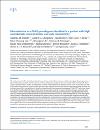Microdeletion in a FAAH pseudogene identified in a patient with high anandamide concentrations and pain insensitivity
| Author | Habib A.M. |
| Author | Okorokov A.L. |
| Author | Hill M.N. |
| Author | Bras J.T. |
| Author | Lee M.-C. |
| Author | Li S. |
| Author | Gossage S.J. |
| Author | van Drimmelen M. |
| Author | Morena M. |
| Author | Houlden H. |
| Author | Ramirez J.D. |
| Author | Bennett D.L.H. |
| Author | Srivastava D. |
| Author | Cox J.J. |
| Available date | 2020-04-27T08:34:20Z |
| Publication Date | 2019 |
| Publication Name | British Journal of Anaesthesia |
| Resource | Scopus |
| ISSN | 70912 |
| Abstract | The study of rare families with inherited pain insensitivity can identify new human-validated analgesic drug targets. Here, a 66-yr-old female presented with nil requirement for postoperative analgesia after a normally painful orthopaedic hand surgery (trapeziectomy). Further investigations revealed a lifelong history of painless injuries, such as frequent cuts and burns, which were observed to heal quickly. We report the causative mutations for this new pain insensitivity disorder: the co-inheritance of (i) a microdeletion in dorsal root ganglia and brain-expressed pseudogene, FAAH-OUT, which we cloned from the fatty-acid amide hydrolase (FAAH) chromosomal region; and (ii) a common functional single-nucleotide polymorphism in FAAH conferring reduced expression and activity. Circulating concentrations of anandamide and related fatty-acid amides (palmitoylethanolamide and oleoylethanolamine) that are all normally degraded by FAAH were significantly elevated in peripheral blood compared with normal control carriers of the hypomorphic single-nucleotide polymorphism. The genetic findings and elevated circulating fatty-acid amides are consistent with a phenotype resulting from enhanced endocannabinoid signalling and a loss of function of FAAH. Our results highlight previously unknown complexity at the FAAH genomic locus involving the expression of FAAH-OUT, a novel pseudogene and long non-coding RNA. These data suggest new routes to develop FAAH-based analgesia by targeting of FAAH-OUT, which could significantly improve the treatment of postoperative pain and potentially chronic pain and anxiety disorders. - 2019 The Author(s) |
| Sponsor | Medical Research Council (Career Development Award G1100340 to JJC); Wellcome Trust ( 200183/Z/15/Z to JJC, 095698Z/11/Z and 202747/Z/16/Z to DLHB); Alzheimer's Society (research fellowship to JTB), University of Cambridge Academic Foundation Programme (to MCL); Molecular Nociception Group (to MCL); National Institutes of Health (Bethesda, MD, USA) Ruth L. Kirschstein Institutional National Research Service Award (to MCL); Wellcome Trust funded London Pain Consortium (to JDR); Colciencias through a Francisco Jose de Caldas Scholarship (LASPAU, Harvard University) (to JDR); Canadian Institutes of Health Research (CIHR; to MNH); CIHR (postdoctoral funding to MM). |
| Language | en |
| Publisher | Elsevier Ltd |
| Subject | anandamide anxiolytic endocannabinoids pain insensitivity postoperative analgesia |
| Type | Article |
| Pagination | e249-e253 |
| Issue Number | 2 |
| Volume Number | 123 |
Check access options
Files in this item
This item appears in the following Collection(s)
-
Medicine Research [1913 items ]



